Frank Valdemara Gomez
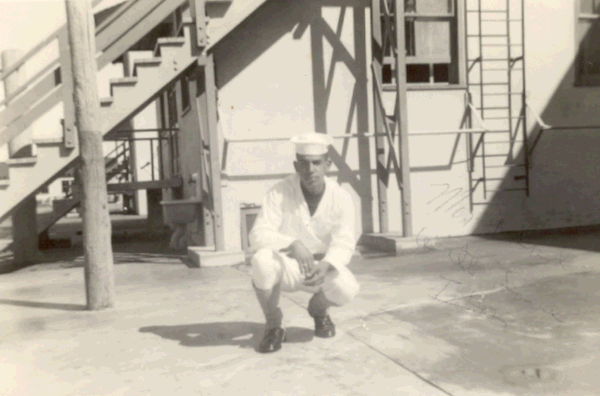

What was your life like at home before going to war?
I was a civilian working at the post office.
Did you just gradate from high school?
No, I had been back and this was my second time back on the service. I graduated in 1954 and was in the Navy in 1955 to 1959. Got out and stayed out a couple of years and went back to the service.
At the time you went back to the service is that when the Vietnam War had started?
No, Vietnam started around 1960 or '61. I was there from 1964 to 1965.
What made you want to join the military?
To serve my country and get an education through the service, and experience, and discipline.
Why did you choose the Navy instead of any other branch of military?
Because in the Navy I figured I would know that I have a clean boat, clean ship, and didnít worry about sleeping on the ground or mud or anything else. I had been in the Marine Corps before. I didnít like that. So, that is the reason I joined the Navy and I had an opportunity to go and do what I liked. And that was being an aircraft controller and control tower operator.
At the time of Vietnam did any of your family members join?
I didnít have any family member that joined.
What did you know about Vietnam before going to war?
Just what I read or heard from my friends that I knew were in the service, and what they had told me before. Some were CVs that worked like in airport buildings and what not.
Some were Green Berets that I knew that told me what was up. I was taking place and knew a bunch of Marines that had been over there once and going back for the second time.
In your opinion did you think that the war was necessary?
At the time yes it was. There were a lot of people, government, or congress or whatever, they didnít want to declare a full war on it. They just kept going little by little just trying to inch in. Too many politics.
Before you went to Vietnam did you go through basic training?
No, cause I already had my basic training when I first went into the service that was in 1955. I went to school to refresh my course, which was aircraft controller.
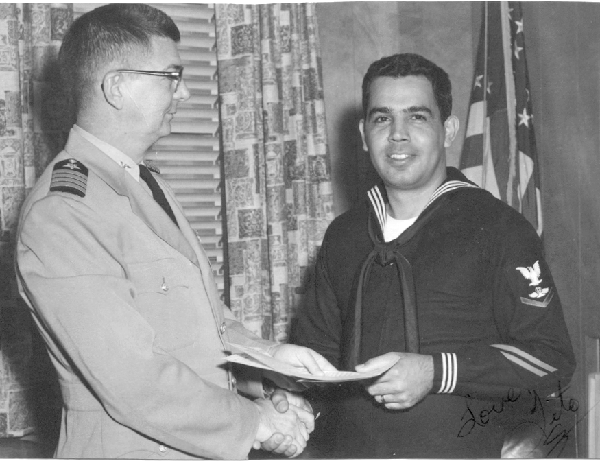
What was the name of the ship that you were on?
I was aboard the USS Guadalcanal that was a helicopter carrier. And then from there USS Independence which is a CVA that was an aircraft attack carrier.
What missions were you involved in?
The only missions we were involved in were directing aircraft to go in and do their bombing to certain areas. Just as important as the Marines, Army, and Air Force that was on the ground we just backed them up. Like when they were blowing up bridges trying to stop the air con to move in from taking over South Vietnam.
Did you get any action or fighting on your ship?
No, the ship was just a support group. But, at that time we had a battleship. Battleship Missouri was firing into the inland from about 20 miles out or so from the shoreline of Vietnam. They were firing their guns.
In your spare time that you might have had on the ship, what did you do?
There was not that much spare time; we worked 19 hours a day, seven days a week. There wasnít too much just mostly trying to catch up on sleep.
Did you receive any medals?
I got the National Defense Medal, Good Conduct Medal, and Vietnam Commendation medal for Vietnam.
When you came back from being overseas did you feel that your life had changed? In what ways?
Yes, I had my son who was only three and a half months when I left and when I came back he was three years old and he didnít know me. He was calling his uncle "dad". That didnít feel very good.
How long before you went to war were you married?
Like the following month. I got married in March and had to leave by May.
Is there anything that the war or just being in the Navy has taught you?
As a person being in the service, you can always depend on yourself to support yourself. You can be a clean person or a bad person or anything like that that from being in the service, they will show that you always have discipline. There is always someone above you that you have to take orders from and all that.
What did you learn from being overseas and seeing everything going on?
It is nothing like being back in America. Just cause you see nice pictures or something from overseas itís not like that. And you always want to come back and when you come back you will appreciate what you have. I am grateful for living in America.
Is there anything that you would like to add to this interview?
No, just hope that any person, female or male, that they want to go into the service that they should. But should go in voluntarily and not be drafted like some were. I think they should go, because they should have some kind of military up bringing. It will teach them the value of life instead of just depending on mom and dad like a lot of them do, and just having babies here and there.
Were you drafted?
No, I volunteered thatís the reason why I donít have any complaints.
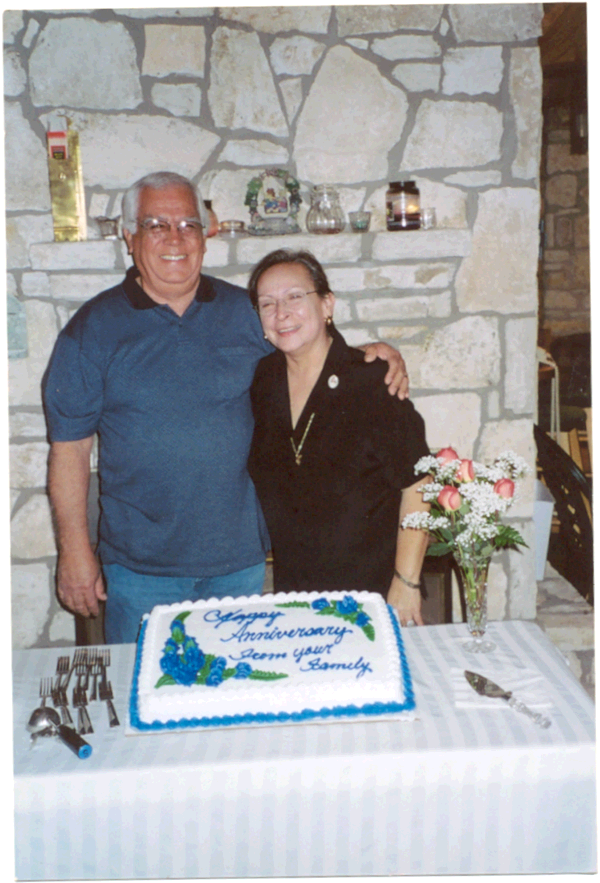
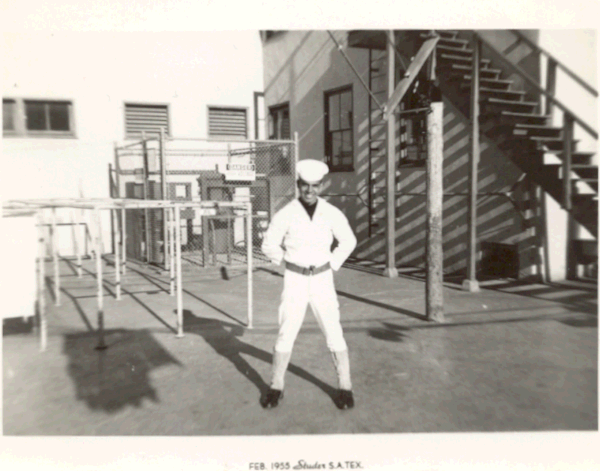
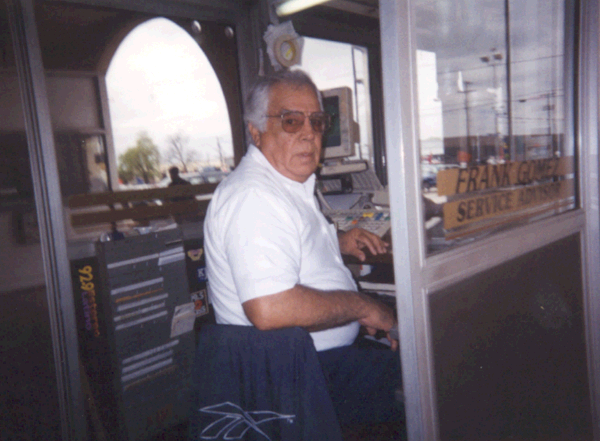
A minimum of FIVE SOURCES is required.
The World Wide Web (WWW)
To cite files available on the WWW, give the author's name, last name first (if known);
the full title of the work, in quotation marks; the title of the complete work (if applicable),
in italics; any version or file numbers; and the date of the document or last revision
(if available). Next, list the protocol (e.g., "http") and the full URL, followed by the
date of access in parentheses. The citation concludes with a brief description of the
web site.
Examples of Internet annotated sites:
The Handbook of Texas Online. Copyright © The Texas State Historical Association. The Handbook of Texas Online is a multidisciplinary encyclopedia of Texas history, geography, and culture sponsored by the Texas State Historical Association and the General Libraries at University of Texas at Austin. http://www.tsha.utexas.edu/handbook/online/ Last Updated: May 16, 2005.
AIER Cost-of-Living Calculator. The calculator uses the Consumer Price Index to do the conversions. The source for the data is the Bureau of Labor Statistics. The calculator converts the cost of items in American dollars from 1913 to the present. Organized in 1933 as a private, independent, scientific, and educational charitable organization, the American Institute for Economic Research plans its research to help individuals protect their personal interests and those of the Nation. American Institute for Economic Research (AIER), P.O. Box 1000, Great Barrington, Mass 01230. http://www.aier.org/colcalc.html. (2005).
Rivas-Rodriguez, Maggie. U.S. Latino and Latina World War II Oral History Project. Department of Journalism, University of Texas at Austin. The stories of Latinos and Latinas World War II have been virtually untold, either in the mass media or in scholarly writing. The main problem has been the small numbers of U.S. Latino journalists, scholars and other writers who would document the stories of this generation. This project seeks to capture the stories of these men and women. http://www.utexas.edu/projects/latinoarchives/ (2000).